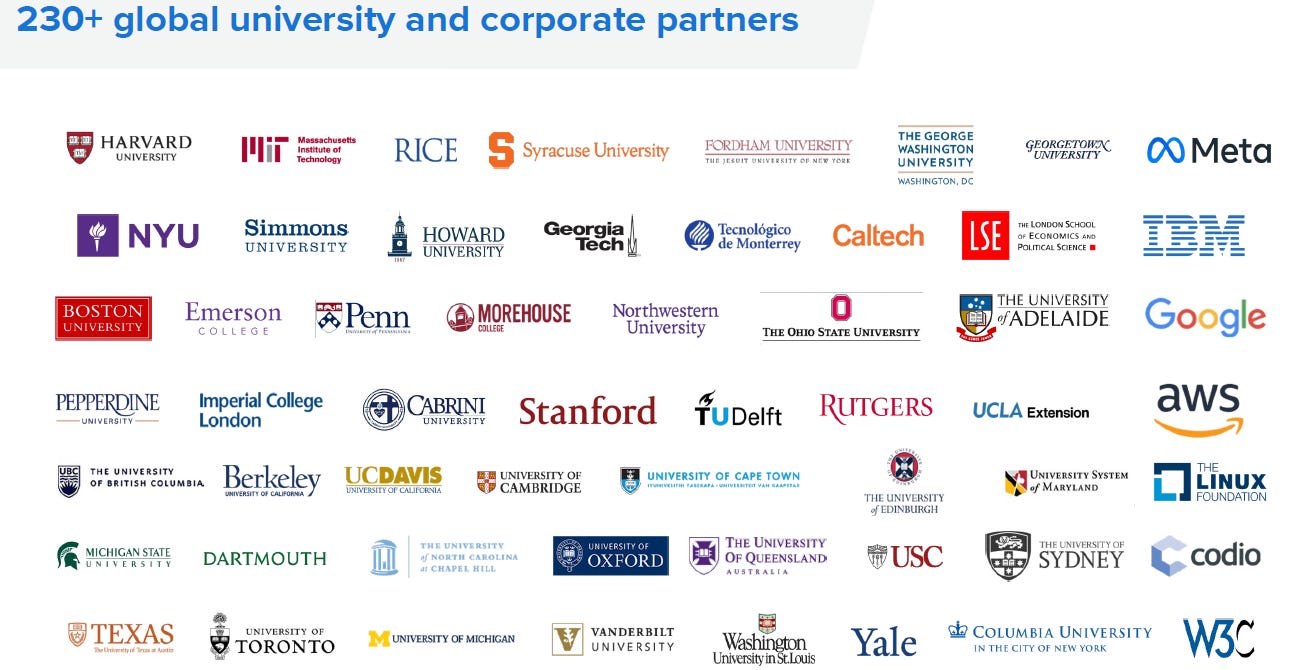2U, Inc. ($TWOU) Capital Structure Considerations
From Expansion to Adaptation: Navigating 2U's Complex Educational Path
Situation Overview:
Who is 2U, Inc.?
Founded in 2008, 2U, Inc. (“TWOU”) is a US educational technology company offering online degree and non-degree programs in partnership with colleges and universities. With last twelve months’ (LTM) revenues of $926 million, its business is divided into degree programs (58%) and alternative credentials (42%). The company, which saw growth during the COVID-19 pandemic due to a surge in online learning, now features over 4,400 digital offerings and collaborates with more than 230 university and corporate partners.
Over the years, TWOU has evolved from a pure-play Online Program Management (OPM) provider to a more diverse educational company. The company expanded into short courses and alternative credentials with its acquisition of GetSmarter in 2017, strengthened its position in bootcamps with the purchase of Trilogy in 2019, and ultimately transitioned into a direct-to-consumer (DTC) platform through its acquisition of EdX in 2021. However, this growth trajectory led to greater operational complexity while also increasing leverage. The company’s largest and most recent acquisition, the purchase of the popular platform EdX for $800 million in cash, was funded with debt, notably compounding its current balance sheet issues.
Challenging Market Environment
TWOU is currently facing several headwinds in the online education sector. Economic uncertainties and recessionary fears have led to a decrease in demand for higher education, resulting in lower enrollment and recruitment challenges. Additionally, there has been a normalization in student enrollment trends post-pandemic, with many students reverting to in-person models. The online education market has also become increasingly crowded, with both established and new competitors vying for market share. This competition has necessitated competitive pricing, innovative programs, and improved user experiences. Moreover, there has been a shift in the market away from traditional online degree programs towards more flexible and affordable options, such as microcredentials and short courses, requiring TWOU to adapt its offerings.
Financial Challenges
For the 10th consecutive quarter, the company’s organic/normalized revenue growth has declined, raising doubts about the effectiveness of its platform strategy and future growth. TWOU’s shift to alternative credentials saw a 3% revenue decline in 3Q’23, notably in coding bootcamps, contradicting expectations of it becoming a major revenue source by 2024. Currently, this segment’s EBITDA margins sit at -16%, deviating from prior positive projections for 2023. The company’s profitable degree program segment is also experiencing a double-digit enrollment decline, partially due to reduced marketing spending aimed at improving profitability. Despite stronger EBITDA margins, the company’s business appears to be shrinking, and with substantial negative FCF (-$48mm), dwindling liquidity ($60mm), and sizeable near-term debt maturities ($380mm), the company faces the prospect of a potential bankruptcy filing.
Financial Advisors Engaged
On November 8, 2023, Bloomberg reported that a majority bondholder group had formed and proposed a transaction to the company that would allow creditors to swap into secured debt and extend the 2025 maturity. This transaction follows a debt financing transaction conducted earlier this year. It appears that the company is actively engaged and considering to pursue a lability management transaction.
CEO Resignation
On November 17, 2023, TWOU announced the immediate resignation of CEO/Co-founder Chip Paucek from his executive role and the BoD. Paucek will remain with the company until December 15th. CFO Paul Lalljie will take over as CEO, and Chief Legal Officer Matthew Norden has been appointed as the new CFO.
Paucek’s departure is notable given his experience in the sector and relationships with key university partners but not unexpected, considering the company’s recent struggles with growth and profitability, especially following its acquisition of edX.
Disclosure: The information provided is for informational purposes only and should not be considered as investment advice. Any investment decisions made based on the information provided are at your own risk. It is essential to conduct your own research and consult a qualified financial advisor before making any investment decisions. Investing involves risks, and past performance is not indicative of future results. By using this information, you acknowledge that you are responsible for your own decisions and release me from any liability. Seek professional advice tailored to your financial situation and objectives.



